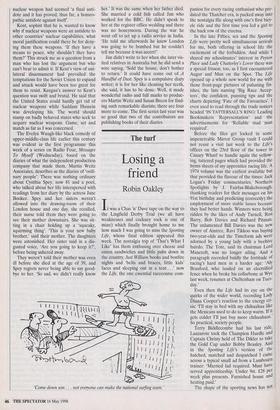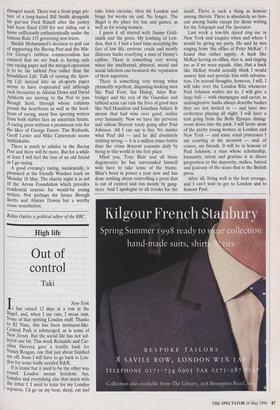The turf
Losing a friend
Robin Oakley
It was a Chas 'n' Dave tape on the way to the Lingfield Derby Trial (we all have weaknesses and cockney rock is one of mine) which finally brought home to me how much I was going to miss the Sporting Life, whose final edition appeared this week. The nostalgia trip of 'That's What I Like' has them enthusing over cheese and onion sandwiches and little pubs down in the country, Just William books and bonfire nights and 'belts and braces, little kids' faces and sleeping out in a tent ...' now the Life, the one essential racecourse corn- panion for every racing enthusiast who pre- dated the Thatcher era, is packed away into the nostalgia file along with one's first bicy- cle ride and the first time you led a girl to the back row of the cinema.
In the late Fifties, sex and the Sporting Life were pretty well simultaneous arrivals for me, both offering in school life the excitement of the forbidden. And while I shared my schoolmates' interest in Peyton Place and Lady Chatterley's Lover there was a special frisson, too, as I first encountered Augur and Man on the Spot. The Life opened up a whole new world for me with those front-page pictures of pulsating fin- ishes, the lists naming 'Big Race Accep- tors', the confident, punning tips and the charts depicting 'Fate of the Favourites'. I even used to read through the trade notices headed 'IN TATTERSALL'S RING: Leading Bookmakers Representation' and the advertisements for 'Reliable stud man required'.
Before the files get locked in some impenetrable Mirror Group vault I could not resist a visit last week to the Life's offices on the 23rd floor of the tower in Canary Wharf to handle again the yellow- ing, tattered pages which had provided the hymn sheets of my apprentice racing life. A 1974 volume was the earliest available but that provided the flavour of the times: Jack Logan's Friday commentaries, Northern Spotlights by J. Fairfax-Blakeborough, thanking readers for their messages on his 91st birthday and predicting (correctly) the employment of more stable lasses because they had better hands. Winners were being ridden by the likes of Andy Turnell, Ron Barry, Bob Davies and Richard Pitman. The unlamented Bill Davies was the new owner of Aintree, Ravi Tikkoo was buying two-year-olds and the Timeform ads were adorned by a young lady with a beehive hairdo. The Tote, said its chairman Lord Mancroft, was no longer ailing. And a paragraph recorded baldly the fortitude of racing's hard men in a harder age: 'AlY Branford, who landed on an electrified fence when he broke his collarbone at Wye last week, resumes at Cheltenham on Tues- day.'
Even then the Life had its eye on the quirks of the wider world, recording Lady Diana Cooper's reaction to the energy cri- sis: 'I'll stay in bed with my chihuahua like the Mexicans used to do to keep warm. If it gets colder I'll just buy more chihuahuas. So practical, society people. Terry Biddlecombe had his last ride, Lanzarote took the Champion Hurdle and Captain Christy held of The alder to take the Gold Cup under Bobby Beasley. And in the Sporting Life's version of the hatched, matched and despatched I came across a typical small ad from a Lambourn trainer: 'Married lad required. Must have served apprenticeship. Under 9st. £28 per week plus presents. Furnished house and heating paid.' The shape of the sporting news has not
changed much. There was a front-page pic- ture of a long-haired Bill Smith alongside his guv'nor Fred Rimell after the jockey had been fined £100 for not riding out a horse sufficiently enthusiastically under the famous Rule 151 governing non-triers.
Sheikh Mohammed's decision to pull out of supporting the Racing Post and the Mir- ror Group's ruthless commercialism has ensured that we are back to having only one racing paper and the merged operation is to be the tabloid Post rather than the broadsheet Life. Talk of turning the Sport- ing Life instead into an all-sports paper seems to have evaporated and although such favourites as Alistair Down and David Ashforth are moving to the Post to join Brough Scott, through whose columns pound the heartbeats as well as the hoof- beats of racing, many fine sporting writers from both stables face an uncertain future. A racing press without a prominent role for the likes of George Ennor, Tim Richards, Geoff Lester and Mike Cattermole seems unthinkable.
There is much to admire in the Racing Post and there will be more. But for a while at least I will feel the loss of an old friend as I go racing.
A good evening's racing, incidentally, is promised at the friendly Windsor track on Monday 18 May. The charity night is in aid of the Arvon Foundation which provides residential courses for would-be young writers. Not perhaps for future Brough Scotts and Alistair Downs but a worthy cause nonetheless.
Robin Oakley is political editor of the BBC.



























































 Previous page
Previous page